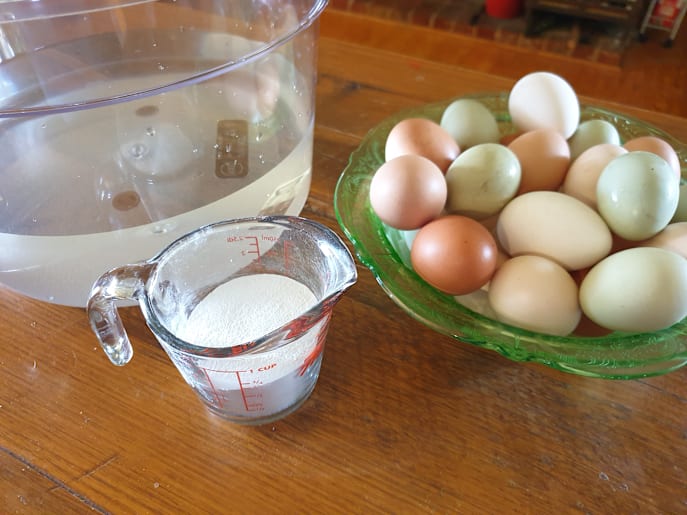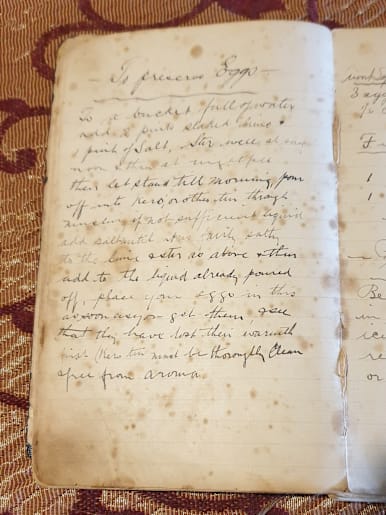Spring has arrived on the homestead.
Flowers are blooming, bees are buzzing, and the chickens are laying eggs at a frankly ridiculous rate.
Anyone who keeps hens will know this seasonal surplus is both a blessing and a tiny logistical challenge.
Luckily, we have a trick that turns this egg glut into a winter treasure: water glassing.
Water glassing is an old fashioned egg preserving method that predates the household fridge.
Latest Stories
Many families used it well into the 1940s and 50s, passing the know how down through generations.
But with supermarkets and freezers becoming commonplace, it is a tradition that has slowly vanished, except on our homestead.
And we have been doing this for around ten years now.
So, why bother preserving eggs at all?
In our snowy Alpine region, the hens take a well earned break in winter.
We do not use artificial lighting.
They get their seasonal holiday whether we like it or not, which means our winter egg supply would otherwise be non existent.
Preserving eggs in spring, when production peaks, ensures we never run out!
The star of this method is hydrated lime, also called slaked lime, builders line or pickling lime.
I bought a 20Kg bag from the hardware store years ago which will last us until, well, the apocalypse.
No fridge is required, a cool, dark spot will do just fine.
In my ten or so years of water glassing, I have had a 100 percent success rate with eggs preserved for 12 months.
Beyond that, I have only ever had one ‘bad’ egg, which is remarkable considering the method is so simple.
We have even been known to use eggs approaching two years old.
Two whole years.
That is longer than some relationships last, just saying...
But not just any egg will do.
You need fresh, unwashed eggs, straight from your own hens or a trusted local farmer.
Store bought eggs have been washed, which strips away their natural protective coating.
Put washed eggs in lime and you will end up with a mess rather than a miracle.
A tip passed down from my great grandmother’s notes: always let freshly laid eggs cool before adding them to the mix.
The simple formula I use is 30 grams of hydrated lime for every litre of non chlorinated water.
Which I put in a clean container and then give it a good stir until the water turns milky.
Once my freshly laid eggs have cooled, I gently place them into the mixture, pointy end down, this keeps the air cell at the top, away from the yolk, it is a small detail, but a good habit when storing eggs in general.
Dirty eggs can be lightly wiped, but never washed.
The eggs natural bloom is like a force field, and as any sci fi fan knows, the force must be protected.
Adding eggs to the lime solution quickly becomes part of our daily rhythm.
Collect them fresh, give each one a quick check, let them cool, then gently place them into your bucket or crock.
It is important not to let the water solution evaporate, so use a container with a lid if possible, or add a thin layer of olive oil on top to seal it and keep any curious critters out.
Store your bucket in a dark, cool spot, and that is it.
Bob’s your uncle, you are done for the day.
When I need one, I just grab it out of our container, give it a quick rinse and it is ready for breakfast, baking, or whatever eggy adventure I have in mind.
They are perfect for cooking, cakes, biscuits, and other baked goods, because when used within the first year, the preservation process can slightly thicken the whites, giving them extra body in recipes.
Beyond that the whites thin and the yolks become fragile, so we avoid using very old eggs in raw recipes like mayonnaise or meringues.
Spring is the ideal moment to start, before the vegetable and fruit preservation rush begins.
By the time winter hits, we’ll have containers brimming with eggs ready to keep our culinary plans on track until the hens start laying again next year.
And there is a certain joy in keeping an old tradition alive, for us it is a practical connection to a simpler time, when fridges were a luxury and every household had a few clever preservation tricks up their sleeves!

















